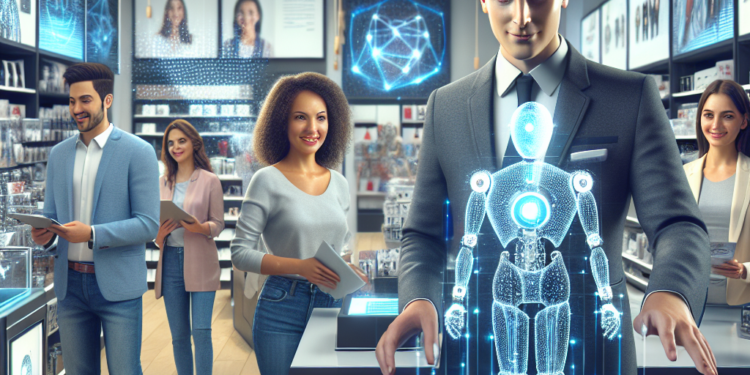Artificial Intelligence (AI) is revolutionizing the way businesses interact with their customers, particularly in the retail industry. By leveraging AI technologies, retailers are able to personalize the customer experience, provide real-time support, and improve overall satisfaction. In this article, we will explore how AI enhances customer experience in retail and the various ways in which retailers are utilizing this technology to drive sales and increase brand loyalty.
One of the key ways in which AI is enhancing customer experience in retail is through personalized recommendations. AI algorithms analyze customer data, including purchase history, browsing behavior, and demographic information, to deliver personalized product recommendations to each individual customer. This not only helps customers discover new products that they may be interested in, but it also helps retailers increase sales by presenting customers with products that are relevant to their preferences and needs.
For example, AI-powered recommendation engines can suggest complementary products to customers based on their previous purchases. If a customer buys a pair of shoes, for instance, the AI algorithm can recommend matching accessories such as a handbag or belt. This not only increases the likelihood of additional sales but also enhances the overall shopping experience for the customer by providing them with personalized suggestions tailored to their tastes and preferences.
Another way in which AI enhances customer experience in retail is through virtual assistants and chatbots. These AI-powered tools provide customers with real-time support and assistance, guiding them through the shopping process and addressing any questions or concerns they may have. Virtual assistants can help customers find products, place orders, track shipments, and resolve issues, all without the need for human intervention.
Chatbots, on the other hand, are able to engage with customers on websites and social media platforms, answering questions and providing information about products, promotions, and store locations. Chatbots can also help customers with basic tasks such as checking order status, making returns, and scheduling appointments, freeing up human customer service representatives to focus on more complex inquiries.
By providing customers with instant access to support and assistance 24/7, virtual assistants and chatbots improve the overall shopping experience and increase customer satisfaction. Customers appreciate the convenience of being able to get help quickly and easily, leading to higher levels of engagement and loyalty.
AI is also being used to enhance the in-store shopping experience through technologies such as facial recognition and smart mirrors. Facial recognition technology can identify customers as they enter a store, allowing retailers to provide personalized recommendations and promotions based on the customer’s purchase history and preferences. Smart mirrors, on the other hand, use AI algorithms to allow customers to virtually try on clothing and accessories, providing a more interactive and engaging shopping experience.
By leveraging these AI technologies, retailers are able to create a seamless shopping experience that blends the convenience of online shopping with the personalization and interactivity of the in-store experience. This not only increases customer engagement but also encourages customers to spend more time and money in the store, leading to higher sales and greater customer satisfaction.
In addition to personalized recommendations, virtual assistants, chatbots, and in-store technologies, AI is also being used to improve inventory management and supply chain efficiency in the retail industry. AI algorithms can analyze sales data, trends, and forecasts to predict consumer demand and optimize inventory levels, reducing out-of-stock situations and increasing sales.
By accurately forecasting demand and optimizing inventory levels, retailers are able to ensure that they have the right products in stock at the right time, improving customer satisfaction and loyalty. AI also helps retailers streamline their supply chain operations by identifying inefficiencies, reducing costs, and improving overall performance.
Overall, AI is revolutionizing the retail industry by enhancing the customer experience in a variety of ways. By providing personalized recommendations, real-time support, and interactive in-store experiences, retailers are able to create a more engaging and seamless shopping experience that drives sales and increases brand loyalty.
As AI technologies continue to evolve and become more sophisticated, the potential for retailers to enhance the customer experience will only continue to grow. By embracing AI and leveraging its capabilities, retailers can stay ahead of the competition, meet the changing needs and expectations of today’s consumers, and build strong, long-lasting relationships with their customers. With AI leading the way, the future of retail looks brighter than ever.













